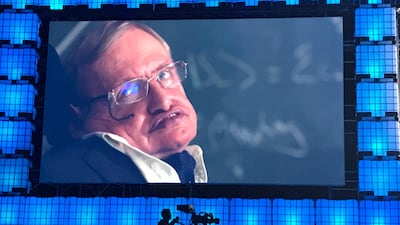Stephen Hawking has heralded a new dawn of humanity: the artificial intelligence revolution.
“We stand on the threshold of a brave new world,” Mr Hawking told an audience at Web Summit, one of the biggest tech events in the world.
"Success in creating effective AI, could be the biggest event in the history of our civilization. Or the worst. We just don't know. So we cannot know if we will be infinitely helped by AI, or ignored by it and side-lined, or conceivably destroyed by it," Mr Hawking said during his keynote speech.
"Unless we learn how to prepare for, and avoid, the potential risks, AI could be the worst event in the history of our civilisation. It brings dangers, like powerful autonomous weapons, or new ways for the few to oppress the many. It could bring great disruption to our economy."
Mr Hawking, one of the world’s most eminent scientists, also highlighted the potential benefits of this infant technology if caution is applied.
“I am an optimist and I believe that we can create AI for the good of the world. That it can work in harmony with us. We simply need to be aware of the dangers, identify them, employ the best possible practice and management, and prepare for its consequences well in advance.”.
Many prominent scientists and experts, including Elon Musk, have spoken out to warn that the risks of AI are not worth the benefits. Mr Hawking himself gave a stark warning in December 2014, saying"the development of full artificial intelligence could spell the end of the human race."
At tonight’s event, he outlined his vision of how AI could be used for good and how strict controls must be put in place to define the technology.
“Our AI systems must do what we want them to do, for the benefit of humanity.
“We cannot predict what we might achieve, when our own minds are amplified by AI. Perhaps with the tools of this new technological revolution, we will be able to undo some of the damage done to the natural world by the last one, industrialisation,” he said.
“We will aim to finally eradicate disease and poverty. Every aspect of our lives will be transformed,” he continued.
Professor Hawking delivered a keynote address on Web Summit’s opening night ceremony via broadcast.
He had been invited to speak at Web Summit by Feedzai, an AI company specialising in fraud prevention.
The English theoretical physicist and Director of Research at the Centre for Theoretical Cosmology at the University of Cambridge said that this generation and the next will be responsible for shaping this disruptive technology.
“We all have a role to play in making sure that we, and the next generation, have not just the opportunity, but the determination, to engage fully with the study of science at an early level, so that we can go on to fulfil our potential, and create a better world for the whole human race,” he explained.
“We need to take learning beyond a theoretical discussion of how AI should be, and take action to make sure we plan for how it can be. You all have the potential to push the boundaries of what is accepted, or expected, and to think big. We stand on the threshold of a brave new world. It is an exciting, if precarious, place to be and you are the pioneers,” he continued.

